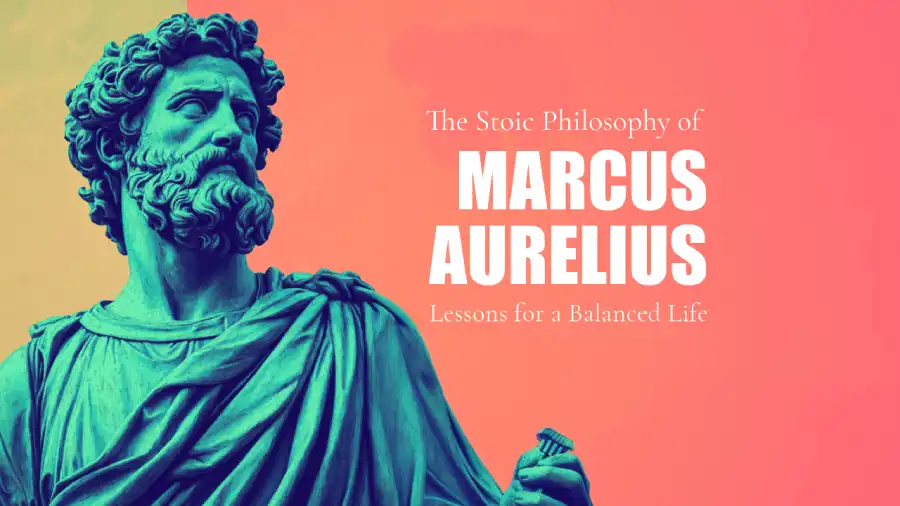
The Philosophy of Marcus Aurelius offers timeless wisdom and guidance, drawing from Stoic principles that continue to inspire and empower individuals today.
Imagine standing at the helm of the Roman Empire, facing relentless challenges, from wars and plagues to political turmoil. Yet, despite these external pressures, Marcus Aurelius managed to cultivate inner peace and wisdom through the practice of Stoicism.
As both a Roman Emperor and a Stoic philosopher, Marcus Aurelius left behind a legacy of thought that has continued to inspire leaders, thinkers, and everyday people for nearly two millennia.
His personal reflections, compiled in Meditations, serve not only as a guide for personal conduct but also as a blueprint for effective and ethical leadership. In this article, we explore the life, philosophy, and enduring lessons of Marcus Aurelius, and how his wisdom can help us lead more balanced lives today.
Who Was Marcus Aurelius?
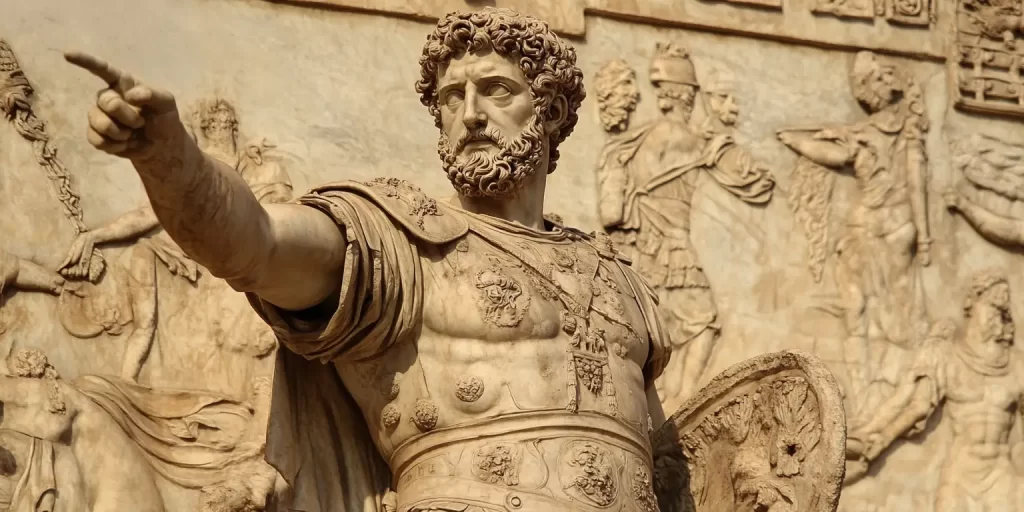
Marcus Aurelius was born in 121 AD into a prominent Roman family. From a young age, he was immersed in the study of philosophy, particularly Stoicism, under the guidance of influential tutors like Junius Rusticus and Apollonius of Chalcedon. His early exposure to Stoic thought laid the foundation for what would become a lifelong commitment to the philosophy.
Ascending to the throne in 161 AD, Marcus Aurelius ruled the Roman Empire during a time of significant upheaval. His reign was marked by military conflicts, including the Marcomannic Wars, as well as the devastating Antonine Plague. Despite these challenges, he is remembered as one of the “Five Good Emperors,” known for his just and compassionate leadership.
What set Marcus apart was his ability to apply Stoic principles to his role as emperor, viewing his position not as a source of power but as a duty to serve the greater good. His unique position as both a ruler and a philosopher provided him with a profound perspective on the human condition, one that he meticulously documented in Meditations.

The Philosophy of Marcus Aurelius – Core Principles
At the heart of the Philosophy of Marcus Aurelius lies a commitment to rationality, virtue, acceptance of the natural order, and a deep sense of duty. These core principles not only shaped his approach to leadership but also provided him with the resilience needed to navigate the tumultuous events of his reign.
Rationality and Virtue:
“Look within. Within is the fountain of good, and it will ever bubble up, if thou wilt ever dig.”
Marcus Aurelius

The philosophy of Marcus Aurelius is centered on the belief that the foundation of a good life is reason and virtue. He viewed rationality as a crucial tool for understanding the world and making sound decisions, while virtue was considered the highest good that one should strive to achieve. In his Meditations, Marcus Aurelius often reflected on the importance of maintaining moral integrity, even in the face of adversity. For him, living in accordance with nature meant aligning one’s actions with reason and virtue, which he believed was the true path to happiness.
Impermanence and Acceptance:
“It is not death that a man should fear, but he should fear never beginning to live.”
Marcus Aurelius

One of the central tenets of the Philosophy of Marcus Aurelius is the acceptance of the natural course of events, including the inevitability of change and death. Marcus Aurelius frequently reminded himself of life’s transient nature, encouraging a mindset of acceptance rather than resistance. This acceptance, as taught in the Philosophy of Marcus Aurelius, wasn’t about passive resignation but rather about focusing on what is within our control and letting go of what is not. By embracing impermanence, Marcus was able to maintain a sense of calm and composure, even in the face of great personal and public challenges.
Enjoying this article? Why not try – 30 Marcus Aurelius Quotes: Inspiring Wisdom for a Fulfilling Life
Duty and Responsibility:
“Waste no more time arguing about what a good man should be. Be one.”
Marcus Aurelius

The philosophy of Marcus Aurelius as emperor was deeply rooted in a profound sense of responsibility to lead with purpose, prioritizing the welfare of his people over his own desires. He viewed his role not as a privilege, but as a duty, believing that true leadership was about serving others. This commitment to duty extended to all aspects of life, where the philosophy of Marcus Aurelius emphasized the importance of contributing to the greater good, and acting with justice and compassion in all endeavours.
Aurelius’ notable work: Meditations
Meditations is not a book that Marcus Aurelius ever intended to publish. Rather, it is a collection of personal reflections, notes, and reminders that he wrote over several years, primarily during his military campaigns between 170 and 180 AD.
These writings, composed as private journals, were meant to help Marcus Aurelius strengthen his own Stoic practice and guide his thoughts amidst the pressures of ruling the Roman Empire. The title Meditations was attributed much later, as the original manuscripts—central to the Philosophy of Marcus Aurelius—did not have a title, since they were not intended for public consumption.
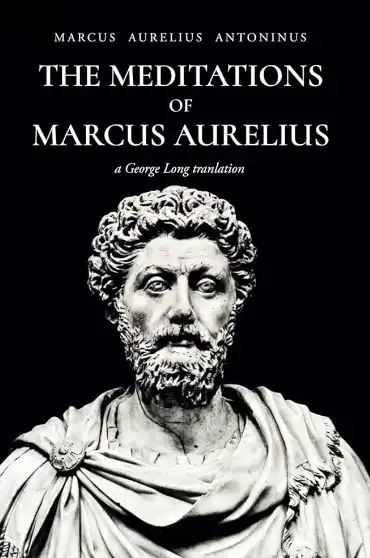
The text is organised into 12 books, each containing a series of aphorisms and reflections that cover a range of topics, from the nature of the universe to the importance of rationality, virtue, and self-discipline.
The writings are deeply introspective and often reveal Marcus’s struggles to live up to the Stoic ideals he so admired.
Despite the highly personal nature of these writings, Meditations has become one of the most influential works in Western philosophy, offering timeless wisdom on how to navigate life’s challenges with dignity and resilience.
The fact that these reflections were penned by a man who wielded immense power, yet sought inner peace and moral integrity, only adds to their enduring appeal.
Key Teachings from Meditations

Reason and Virtue
The Meditations is a treasure trove of Stoic wisdom, offering profound insights into the Philosophy of Marcus Aurelius on life, leadership, and personal conduct. One of the most impactful passages is his reflection that:
“The happiness of your life depends upon the quality of your thoughts.”
Marcus Aurelius

This statement underscores the Stoic belief that our perception of events, rather than the events themselves, determines our emotional state. The Stoics taught that external events are inherently neutral; it is our interpretation of these events that imbues them with meaning, whether positive or negative.
The Philosophy of Marcus Aurelius frequently emphasises that it is not the actions of others or the circumstances we face that cause us distress, but rather our own judgements and attitudes toward those actions and circumstances.
By recognising that our emotional reactions are shaped by our internal beliefs and interpretations, the Philosophy of Marcus Aurelius teaches us that we gain the power to choose how we respond to life’s challenges.
In his Meditations, the Philosophy of Marcus Aurelius frequently emphasizes the importance of responding to difficulties with reason and virtue, rather than succumbing to negative emotions. He understood that by keeping his mind clear and rational, he could make better decisions and maintain his integrity, even in the most challenging circumstances.
This practice of emotional equanimity is central to the Philosophy of Marcus Aurelius, which is why he is remembered not just as a powerful ruler, but as a wise and virtuous leader whose teachings continue to inspire to this day.

Modern Application
The Stoics believed that by practising mindfulness and self-awareness, we can train our minds to respond with reason rather than emotion. This doesn’t mean suppressing feelings, but rather understanding and managing them in a way that aligns with our values and virtues.
When we approach situations with a clear, rational mindset, we are less likely to be swayed by fear, anger, or despair. In the Stoic tradition, these emotions are seen as responses to our judgements about external events rather than the events themselves.
When our judgements are clouded by irrational thoughts or unexamined beliefs, our emotions can spiral out of control, leading us to react impulsively or destructively. However, by cultivating a mindset rooted in reason and objectivity, we can assess situations more clearly and respond in ways that align with our values and long-term goals.
This rational approach, central to the Philosophy of Marcus Aurelius, allows us to maintain a sense of inner peace, even when external circumstances are challenging or unpredictable. For example, when faced with criticism, instead of immediately reacting with anger or defensiveness, the Philosophy of Marcus Aurelius teaches us to pause and consider the validity of the critique, the intentions behind it, and how it might be used constructively. This measured response not only diffuses negative emotions but also enables us to learn and grow from the experience.
The resilience that comes from this practice is what enables a person to remain calm and composed in the face of adversity. It is the embodiment of the Stoic ideal of emotional equanimity, where one’s inner state remains balanced regardless of external turmoil.
This does not mean that Stoics are emotionless or indifferent, but rather that they have trained themselves to respond to life’s ups and downs with a stable and composed mindset, focusing on what they can control and accepting what they cannot.

The Dichotomy of Control
Another key teaching from Meditations is the idea of focusing on what is within our control. Marcus Aurelius wrote,
“You have power over your mind—not outside events. Realise this, and you will find strength.”
Marcus Aurelius

This principle is central to Stoicism, which teaches that while we cannot control what happens to us, we can control how we respond. The Stoics recognised that the world is full of unpredictability and that external events, from the actions of others to natural disasters, are often beyond our influence.
What we can control, however, is our own mindset and behaviour. This distinction between what is within our control and what is not forms the bedrock of Stoic practice. By focusing our energy on our responses—our thoughts, decisions, and actions—we can maintain our composure and integrity no matter what life throws our way.

Modern Application
In today’s world, the Philosophy of Marcus Aurelius is particularly relevant as we navigate a landscape filled with uncertainties and challenges, from global crises like pandemics and climate change to personal struggles such as career setbacks or relationship difficulties. The rapid pace of modern life often leaves us feeling overwhelmed by the sheer number of variables outside our control. The Philosophy of Marcus Aurelius offers a way to reclaim our sense of agency by shifting our focus from the uncontrollable to the controllable—our reactions.
For instance, when faced with unexpected events, a Stoic would ask: “What can I do about this situation that is within my power?” This could mean choosing to remain calm in a stressful scenario, finding constructive solutions rather than dwelling on problems, or maintaining a positive attitude despite adversity.
By internalising this approach, we empower ourselves to act with purpose and clarity, rather than being at the mercy of external circumstances. This shift not only reduces anxiety but also builds resilience, enabling us to face life’s challenges with greater confidence and peace of mind.
The relevance of this Stoic principle today is evident in various fields, including psychology, where concepts like cognitive-behavioural therapy (CBT) draw directly from Stoic ideas. CBT teaches that by changing our thoughts, we can change our emotional experiences, a direct parallel to the Stoic belief in the power of our responses. In essence, Stoicism provides a timeless toolkit for managing the inevitable uncertainties of life, helping us to focus on what truly matters—our character and actions—while letting go of the rest.
Final Thoughts
The wisdom of Marcus Aurelius, as captured in his Meditations, continues to resonate because it addresses the fundamental challenges of human existence. His Stoic philosophy teaches us that while we cannot always control our circumstances, we can control our reactions, and that by living virtuously, we can find peace and purpose.
As we reflect on the teachings of Marcus Aurelius, let us strive to apply his Stoic principles in our own lives, embracing change, cultivating rationality, and fulfilling our duties with grace and integrity. Exploring Meditations offers not just a glimpse into the mind of a philosopher-king, but a road-map for leading a balanced and meaningful life.
FAQs
What are the philosophies of Marcus Aurelius?
Marcus Aurelius’s philosophies are deeply rooted in Stoicism, emphasising rationality, virtue, self-discipline, and the acceptance of fate. He believed in focusing on what we can control—our thoughts and actions—while maintaining equanimity in the face of external events. His teachings encourage living in harmony with nature, acting justly, and finding inner peace by aligning with one’s true purpose.
What is the main idea of Stoic philosophy?
The main idea of Stoic philosophy is that true happiness and tranquility come from accepting what we cannot control and focusing on what we can—our own thoughts, decisions, and actions. Stoicism teaches that by cultivating virtue (wisdom, courage, justice, and temperance), we can live a fulfilling life, regardless of external circumstances.
What are the 7 Stoic principles of Marcus Aurelius?
The key Stoic principles often attributed to Marcus Aurelius include:
1. Control what you can, accept what you cannot.
2. Live according to nature and reason.
3. Embrace adversity as an opportunity for growth.
4. Practice self-discipline and moderation.
5. Cultivate gratitude and focus on the present.
6. Act with justice, integrity, and kindness.
7. Remember the impermanence of life and the importance of humility.
What are Marcus Aurelius ethics?
Marcus Aurelius’s ethics revolve around the pursuit of virtue, which he saw as the highest good. His ethical teachings emphasise the importance of living in accordance with nature, practicing justice, self-control, and wisdom, and treating others with kindness and respect. He believed that ethical behaviour is central to a fulfilling life, and that true strength comes from inner moral character rather than external success or power.




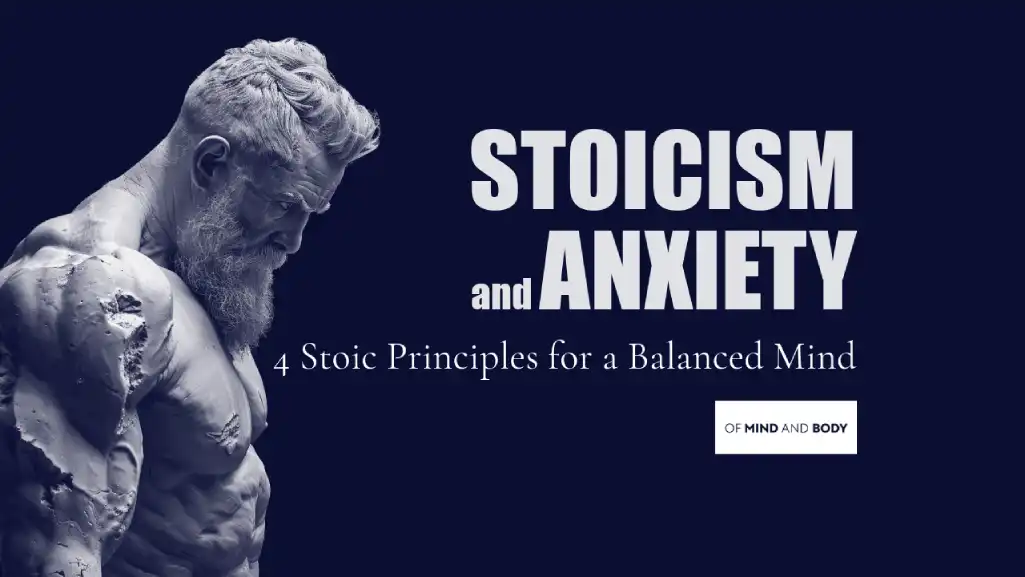







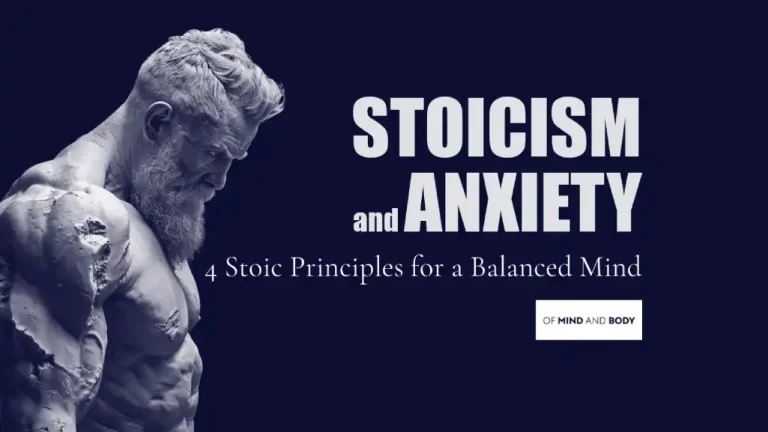


2 responses
I am only halfway through Meditations, but I can already say that in terms of philosophy, I should have started with this. To be fair, it is not an easy read, and unless one is willing to honestly reflect on themselves with a moral mindset, it would lose its value. Having read it yourself, I am sure you already know that this article barely scratches the surface. My only add to your article, is that Marcus went into other philosophies as well in Meditations, and it went well beyond Stoicism. Again, as you know it is not an easy ready. Still, it has a one that has me hooked. It is something not just to read, but to study, and apply.
Hi,
Thanks for reaching out.
I agree, the topic is vast and deep and could take years to fully digest and understand. The aim of my website is to provide useful tips for people to apply stoicism (and other philosophies) in their lives. There are many articles out there that go deeper into Marcus Aurelius’ life and teachings than mine, but I wanted to give a brief overview of each philosopher and to provide the reader with the resources to investigate further should they desire. I don’t claim to be an expert on each philosopher, but I want to provide enough information to allow people to reflect on their own situations and hopefully begin to apply a philosophy that resonates with them.